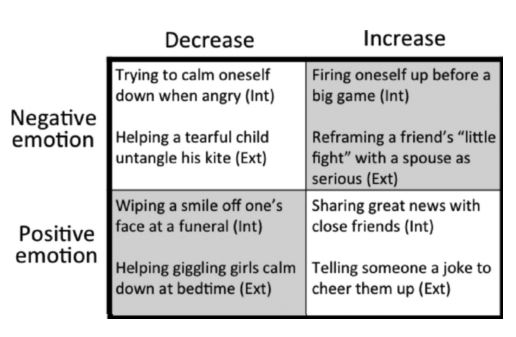When it comes to emotions, we often talk about two different things, what they seem to mean and whether they are helpful to us or not. This article will focus on how we deal with the latter topic. It is practically impossible for us to not ascribe things value, even the very mechanism we use to ascribe value: emotion or affect. When we learn about the utility and danger of emotions and affects, we learn to “regulate” them according to the goals we wish to accomplish.
There are several strategies to make our emotional and impulsive life work in favor of our self-oriented or long-term goals. One of them is consciously selecting and curating the situations in which one encounters. Some situations call for certain behaviors, and if those behaviors are ideal for a long-term goal, then it would be the case that a strategy for evoking those behaviors and emotions would be considered emotional regulation.
But this powerful regulation strategy is not to be used without caution or preparation. To know which situations one ought to put oneself into or take oneself out of, we need to have a good idea of how we will act in such potential situations. To use this strategy of emotional regulation, as well as the others, we must have an intensely accurate self-awareness that does not allow the power of this weapon to narrow your life.
The Need to Regulate Emotion
In any given situation, we are working to accommodate many possible goals, many of them are implicit, or so obvious that they don’t even draw our attention. The emotions that we have in response to the interaction between goal and environment helps us navigate the world. We ascribe the world value by this relationship. This can be thought of as the first level of emotionality.
Rarely is a complex situation able to be interacted with in a way that every important goal is taken into adequate consideration. These complex situations are practically inevitable given the complexity of our social lives especially the endless possibilities and combinations in which situations can be changed by the entrance of a person. Inevitably, the way we feel or act will contradict another goal that we might have, in the moment, risen above the current emotion. We have this dilemma in how we are used to acting and feeling, and how we wish we would act or feel.
When our emotions themselves start to make up our situation, we are able to have “emotions” about those emotions. We then act to “regulate” ourselves in order to stay in line with another activated goal. Many of the obvious examples of emotional regulation is in the effort to remove the discomfort of emotions with negative affect. We do this because our goals are often hedonic in nature and seek comfort and pleasure. Hedonic mindsets clearly have their utility in survival, but other instances of regulation are for long term or social goals.
A career goal means that we must restrict our actions to what we bring about the career we want. If we want to improve a skill, we will pay attention to and intensify the negative feedback that we get in order to prevent ourselves from making that mistake again. If our current goal is to enjoy life (a hedonic goal) we will downregulate negative emotion and upregulate positive emotion. Often, but not always, the long-term is in opposition to the short-term goals.

Situation Selection
Regarding this need for regulating affects and emotions, we are equipped with many strategies in which we can point our emotions towards other goals. Along with blunt things like suppression and choosing to control one’s response, there are some more elegant or intelligent or easier strategies. One of the most effective strategies for emotion regulation is situation selection.
By being consciously selective of the situations that we will put ourselves in, we can ensure many of the emotions we feel and impulses we have will never be realized or, if desired, will be made more likely to be realized. We can avoid temptations before they become temptations; we can go to a place that will always cheer us up. Basically, with the strategy of situation selection, we can curate our emotional lives in a way that allows us to control what emotions we have on a fairly consistent level.
If you do not want to give into the temptation to drink alcohol, simply avoiding the situations that give rise to that temptation will be a great help. Don’t go to the bar, don’t have any alcohol in the house, don’t hang out with the group of friends that will encourage drinking. Creating and choosing one’s situation is so effective that even dire cravings can pass by without submitting to temptation. This example is to avoid a negative emotion (temptation) of because of its discomfort, but there are about three other categories of emotional regulation that we use this strategy for.
We can also approach negative emotion. If your higher goals are to improve a skill, you can put yourself in situation that requires you to perform with higher stakes. The Beatles, and other bands, are said to have played innumerable hours live as a way of practicing with the anxiety and pressure to perform well. Being in high pressure situations is ideal for seeking to gain new skills.
Another obvious use of situation selection is to go where positive emotion reigns strong. For instance, when we may be feeling sad or lonely, we can go volunteer to help others or go out with a close friend. Regardless of how you were feeling before, the positive situation calls forth the positive emotion and may relieve the negative emotion by forcing it into positive situations. Just by putting yourself in a place that is more pleasant can help.
We may also which to avoid positive emotional situations. Avoiding going somewhere where you will indulge in harmful but pleasurable actions is avoiding a good emotion situation. We may also avoid high energy places if you are planning on going to bed soon or if high energy does not suit the personality we want to portray.
The Necessity of Self-Awareness
Johnmarshall Reeve, in his textbook Understanding Motivation and Emotion, says about situation selection that, “by selecting one situation rather than another, we tip the odds significantly whether we will encounter this or that significant life.” It is subtly put here that the problem with situation selection is actually how effective a strategy it is. We can make a choice, small at the time, that has proliferating effects on where our lives will go. A single choice of situation can disproportionately alter the trajectory of your life. The choice to visit a foreign land, to take a frightening job opportunity, or to simply walk into the restaurant of your first date with someone you may eventually marry are made with far more ease than their consequences should allow.
The seriousness of this emotion regulation strategy should be impressed upon anyone who would use it lightly or unconsciously. The goals we orient ourselves to will find their way to manifest themselves through this strategy, whether those goals (and their consequences) are truly desired or not.
It is then obvious that you need to know yourself and be able to predict a situation very well in order to utilize this emotional regulation strategy. We know that a rare instance where you go where you did not want to go, but were happy you did. These moments show us that we do not really know what the best situations are for us to be in. I can say that much of these moments of gratitude for my choices of situation selection have come serendipitously and only in retrospect can I say that it was a good choice.
“Despite the commonness of situation selection, it is often difficult to tell how one will feel in different situations . . . literature suggests that people show an impact bias, meaning that they tend to overestimate the intensity and duration of negative and positive affective states that arise from significant events.”
James Gross in “Emotion Regulation: Current Status and Future Prospects”

Having a serious understanding and commitment to your goals can help make new decisions for what situations to involve yourself in. You should define your goals well so that you know when you are missing an opportunity or what situations don’t help you. Rather than relying on pure willpower to get what you want, putting yourself in the right situations can make a goal far more possible. On the same token, you can put yourself in places where your own personal hell can arise because you had not realized that you’ve been solidifying your bad tendencies as you keep to your old environments.
It is also a great skill to be able to know how you would act in a situation, particularly a novel situation. It is not obvious that you know how you’d act. You do not know that putting yourself in a dangerous situation would not lead to a traumatic experience rather than a growth experience. You do not know that if you were in a political or ideological group that you would not become one of the worst people. It may be worth the imagination of possible situations and the skills and emotions they call forward that can help you decide when to put yourself somewhere different.




